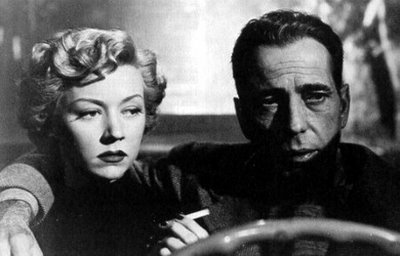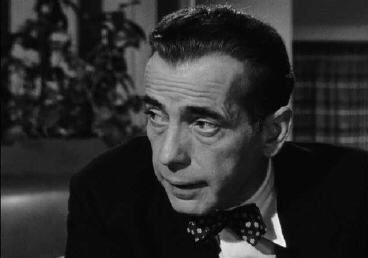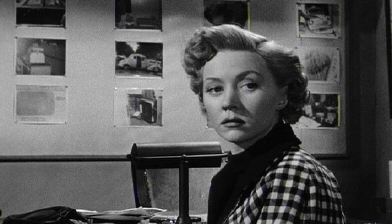
SECOND CHANCES
christopher funderburg
NICHOLAS RAY
page 3
In a Lonely Place

Things got off on the wrong foot when I glanced at the program guide and noticed a loving pull-quote for the film from noted super-hack Curtis Hanson. Film Forum, if you're trying to win me over, let's not bring the director of The River Wild and Lucky You into this. You're only going to make me skeptical. I tried to shake off the knowledge that I was headed into something that influenced The Hand that Rocks the Cradle and opened my mind. Lucky me, things got off to a good start with the movie and I quickly settled into the film agreeably.
The outline: screenwriter Dixon Steele (Humphrey Bogart) is on the verge of being washed-up, so his agent is pushing him to adapt a best-selling novel for a hot-shot director. Steele is more or less disinterested, so rather than read the thing himself, he hires a coat-check girl who has read it to come back to his apartment and tell him the plot. This takes up roughly the first third of the film and it's by far the best section of the film. It's classic Hollywood satirical farce, written in the style of a Hecht and MacArthur comedy; quip-laden dialog bounced between wry protagonists and dim-bulb foils with rapid-fire delivery. It's as funny as Billy Wilder at his best.
Next, Steele's rousted at sunrise (he hasn't been up this early in years) and taken to the police station – it seems the coat-check girl was killed sometime after he sent her off in the middle of the night to the cab-stand around the corner. Steele's striking blonde neighbor (Gloria Grahame as "Laurel Gray") is called in as a witness and exonerates him – she saw him at home when the killer would've been up in the Hollywood hills dumping the body. From there, the neighbors strike up a whirlwind romance that results in Steele curing his writer's block and churning out pages for what seems will be his next masterpiece. But the police still have their doubts: the chief is convinced Steele is their man and his erratic, violent behavior causes Laurel to fear the possibility that her fiancée (I said the romance was whirlwind) may be the kind of guy who could brutally strangle a bubble-headed coat-check girl.
The final third of the film focuses almost exclusively on Grahame's doubt-wracked character. Because of her growing anxiety (which metastasizes surprisingly quickly into full-blown hysteria), she decides that it would probably be for the best to get away from Steele before he puts her in a fatal chokehold. At this point, Bogart’s character is largely shunted to the side with secondary characters like a butch lady-masseuse and a police officer's wife being given significant screen-time as Laurel Gray vacillates between love and terror.
The film is generally considered one of Ray's finest and that's a little unfortunate in the context of this article – even the kindest critic should be able to admit that it's severely flawed at best. There's plenty to like about it, but just as much to dislike. Ultimately, there are three main things to be said about In a Lonely Place; 1) Humphrey Bogart is awesome; 2) Gloria Grahame is completely talentless and a total waste of space; 3) Ray's direction is utterly standard. The goal here is to see if I can come around on Ray, so let's start with the positives and this film has a HUGE positive in Bogart.
 Bogart is one of the all-time greats and this film is as much of a showcase role as any of his other classics. As a matter of fact, he gets the opportunity to go beyond the reliable star persona on display in Casablanca, The African Queen or The Big Sleep – here, he can wallow in some darker, unpleasant moments unthinkable in most of his other work. Nevertheless, he's at his best in those genuinely amusing early scenes when he can tear into the badinage: he's most at home spitting out acidic one-liners at frustrated friends and oblivious underlings. He's belligerent, but in an incredibly enjoyable way – he's more of a rascal than a thug. He has a great moment in the very first scene where a corpulent driver challenges him to a fight over a girl:
Bogart is one of the all-time greats and this film is as much of a showcase role as any of his other classics. As a matter of fact, he gets the opportunity to go beyond the reliable star persona on display in Casablanca, The African Queen or The Big Sleep – here, he can wallow in some darker, unpleasant moments unthinkable in most of his other work. Nevertheless, he's at his best in those genuinely amusing early scenes when he can tear into the badinage: he's most at home spitting out acidic one-liners at frustrated friends and oblivious underlings. He's belligerent, but in an incredibly enjoyable way – he's more of a rascal than a thug. He has a great moment in the very first scene where a corpulent driver challenges him to a fight over a girl:
Fat Motorist: Why don't you pull over to the sidewalk!
Steele: [getting out of his car in the middle of the street] What's wrong with right here?
So long as the movie is resting on Bogart's shoulders, it's on solid ground and I looked forward to spending an hour and a half carousing with Bogart's drunken, violent ne'er-do-well. And for 25 minutes or so, his famous hang-dog features and world-weary air are put to perfect use. He instantly possesses character and it quickly becomes impossible to imagine any other actor so effortlessly blending intellectual agility, physical dominance and aloof humor with the correct amount of defeatism and unfocused resentment. The early going of In a Lonely Place is thrilling and that's almost all Bogart – sure, the writing is terrific, but Bogart hammers the role.
However, even Bogart doesn't escape unscathed because it's impossible to watch In a Lonely Place and not think of Alfred Hitchcock's Shadow of a Doubt, which covers very similar ground. And furthermore, it's impossible to not see Hitchcock's handling of the material as a blueprint for getting right everything Ray's film gets wrong. The most important factor in Shadow of a Doubt is Joseph Cotton's extraordinary performance: by design, Cotton's potential for murderous misdeeds is inseparable from any other aspect of his fascinatingly peculiar character. He's borderline sociopathic in all his words and actions – at times, charmingly so; at other times, disturbingly so. In contrast, Ray repeatedly flips a crazy switch with Bogart and his smirking cynic abruptly transforms into a wild-eyed loony. These digressions into impassioned malevolence feel more than a little forced and as a result come across like plot machinations: they don't feel like they're revealing something authentic about the character so much as goading along the plot. (In that respect, they remind me of another Hitchcock film, Suspicion, which is peppered with utterly silly shots of Cary Grant looking like a nutjob.)
 Once the film digs into the meat of the plot, the most compelling elements of Bogart's character start slipping away and come to be replaced by the tediously one-dimensional lunatic; which brings me to my second point: Gloria Grahame is horrendous for her part and once the plots brings her into the foreground, it never recovers. Bogart is the real deal, a bona fide movie star who could probably be interesting doing the proverbial phone-book oratory and to force him to the side in favor of Grahame is just a disaster. Again, to compare, Hitchcock's Shadow of a Doubt never wastes too much time on Teresa Wright's bland innocent (the ostensible protagonist); he knows Cotton is the whole show and keeps his attention squarely where it belongs. Ray seems helpless to prevent his film from sinking in a mire of plot mechanics wholly unredeemed by Grahame's pitiful performance. From her first lines she's painfully wooden, it's plain as day that she doesn't have anything to recommend her aside from her icy blonde beauty.
Once the film digs into the meat of the plot, the most compelling elements of Bogart's character start slipping away and come to be replaced by the tediously one-dimensional lunatic; which brings me to my second point: Gloria Grahame is horrendous for her part and once the plots brings her into the foreground, it never recovers. Bogart is the real deal, a bona fide movie star who could probably be interesting doing the proverbial phone-book oratory and to force him to the side in favor of Grahame is just a disaster. Again, to compare, Hitchcock's Shadow of a Doubt never wastes too much time on Teresa Wright's bland innocent (the ostensible protagonist); he knows Cotton is the whole show and keeps his attention squarely where it belongs. Ray seems helpless to prevent his film from sinking in a mire of plot mechanics wholly unredeemed by Grahame's pitiful performance. From her first lines she's painfully wooden, it's plain as day that she doesn't have anything to recommend her aside from her icy blonde beauty.
Grahame happened to be Ray's wife and apparently they were going through a painful divorce at the time of the filming.* I would believe it if you told me that Grahame's sheer awfulness was a bitter tactic intentionally employed by Ray in an attempt to destroy her career; she's that bad. When an actress has you accepting the possibility that her performance was the result of malicious sabotage, there's not much more to say. By all accounts, Ray and Grahame handled the shooting of the film like complete pros, but maybe he erred too much on the side of professionalism: any clear-headed director should've been able to see what a disaster she is. And the film just grinds to a narrative stand-still as it follows her character more and more closely. The last fifteen minutes of the film is arduously boring with Bogart scarcely to be seen and save us from the tedium. Even if Grahame could pull it off, I'm not sure the endless scenes of Laurel Gray trying to make up her mind about Steele would ever be interesting. It's bad writing smeared with bad acting.
(continued on page 4 of "Second Chances: Nicholas Ray")
* Also, I have no reason to mention it, but I’m sure you will be delighted to hear that later on Ray’s son (from, um, a different marriage) went on to marry Grahame. Dammit, how could I pass up an anecdote like that!?
<<Previous Page 1 2 3 4 Next Page>>
home about contact us featured writings years in review film productions
All rights reserved The Pink Smoke © 2009